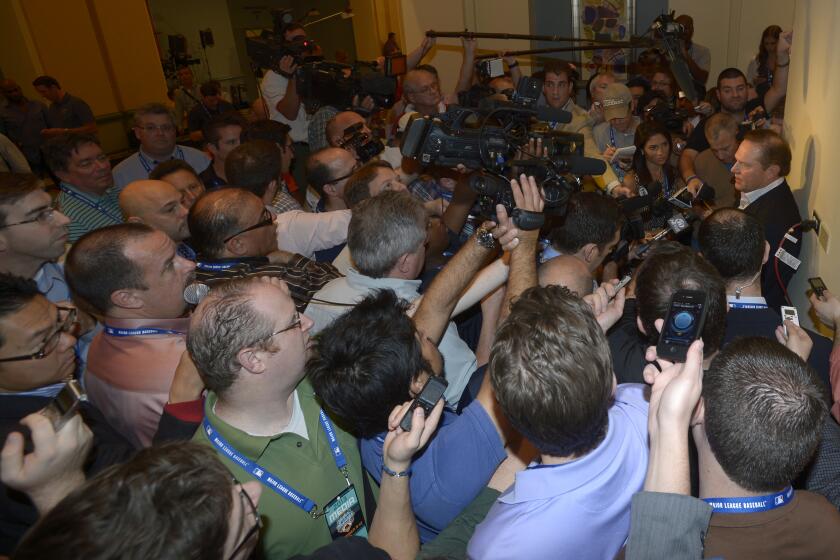L.A. County’s lone minor league team is one of dozens of affiliates eliminated by MLB
- Share via
The Lancaster JetHawks, the lone minor league baseball team in Los Angeles County, died Wednesday. The JetHawks were 24. They died at the hands of Major League Baseball.
They leave behind two California League championships, an alumni roster that includes World Series champions Jose Altuve, Alex Bregman, Carlos Correa and Kiké Hernandez, and an Antelope Valley region of half a million residents, robbed of its only pro sports team.
The long and hot summers will be uninterrupted by the joy of a night at the community ballpark, rooting on prospects as they climb the minor league ladder. No more dogs on Bark and Brews nights, no more Thirsty Thursdays and family Sundays, no more of the beloved KaBoom mascot bopping into hospitals and schools to cheer up local kids.
Baseball needs kids, and lots of them. It is a slow-paced, big-screen sport in a fast-paced, small-screen world. The average fan is eligible for AARP membership, the middle class has been priced out of major league ballparks, and there are better ways to develop the next generation of fans than by killing off dozens of the minor league teams that sell reasonably priced fun.
This is the third California League team to perish in the last five years, following Bakersfield and High Desert, in areas north of Los Angeles where an affordable family home is not an oxymoron. California is the most populous state in the country, but MLB is blowing off the territory between Dodger Stadium and Visalia, 200 miles away.
Dodgers scout Jairo Castillo died Sunday at 31 due to complications from COVID-19. His death comes shortly after that of Dodgers scout Lon Joyce, 72.
In restructuring the minor leagues, MLB prioritized geographical considerations for major league teams. The Washington Nationals wanted out of Fresno, and all the West Coast teams chose to retain their current affiliations in the triple-A Pacific Coast League.
At the same time, the Colorado Rockies wanted out of Lancaster. The stadium is fine, and optimally located within the Class A California League, but major league teams dislike the high-desert winds that complicate the development and evaluation of pitchers.
For MLB, the solution was easy: Move the Rockies’ California League team to Fresno. The negotiations were easy too: Take it or leave it.
Fresno officials were furious, with their predecessors and with MLB. City council President Miguel Arias said the city had spent $50 million in construction and subsidies for what he called “the city’s most expensive impulse buy,” a ballpark pitched as a foundation for urban revitalization.
“The stadium was overhyped as a golden ticket to rejuvenating downtown,” Arias said.
Now the city faced two choices, described by Mayor Lee Brand as “bad or worse.” Play Class A baseball in a stadium designed for a triple-A team, or mothball the ballpark as a downtown eyesore, at an annual maintenance cost of $3.5 million.
During a normal year, agent Scott Boras speaks while surrounded by reporters at the MLB winter meetings. This year, Boras will take his act to Zoom.
The city swallowed hard and took the Class A option, negotiating a new stadium lease in which the city cut the team’s rent by $400,000 per year and assumed liability for up to $300,000 per year in team utility costs. That new subsidy could pay for seven police officers, Arias said.
In Fresno, at least, the team was saved. In Lancaster, where taxpayers had spent $30 million on their ballpark, team officials waited to hear what MLB might offer to replace the affiliated team. There is no established independent league for the JetHawks to join. MLB could offer to assist the JetHawks and the city in operating a California Collegiate League summer team, but 20 home dates each year and crowds largely consisting of friends and family might not be attractive.
“Trying to keep that maintenance level for some other team, I don’t think, is viable,” Lancaster city manager Jason Caudle said.
The city’s lease with the JetHawks extends through 2024. Mayor R. Rex Parris said the city is “evaluating our operational and legal options regarding the future of baseball in Lancaster.”
If the MLB owners can come up with a better way to run the minor leagues, more power to them. They have made logical changes, and they will save millions, but they have made few friends along the way.
Somewhere in this favored land, the sun is shining bright. The band is playing somewhere, and somewhere hearts are light. And somewhere men are laughing, and somewhere children shout.
But there is no joy in Lancaster. Major League Baseball has struck out.
More to Read
Go beyond the scoreboard
Get the latest on L.A.'s teams in the daily Sports Report newsletter.
You may occasionally receive promotional content from the Los Angeles Times.











